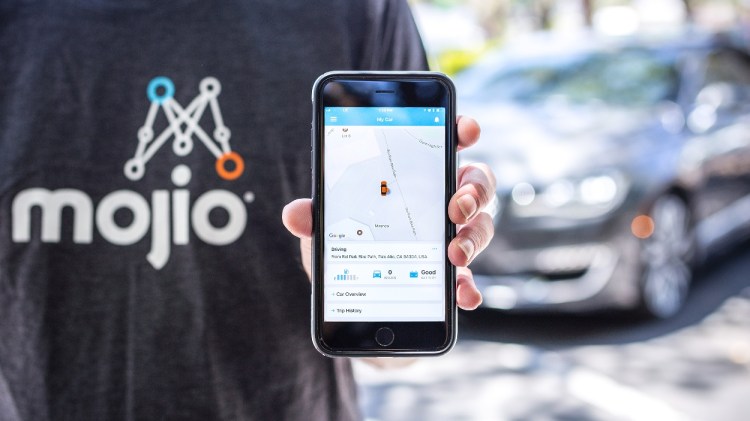There will be an estimated 200 million connected cars on the world’s roads by 2020, a number that could rise to nearly 500 million in the U.S., Europe, and China alone by 2025. One of the big by-products of all these connected automobiles is data — location data, diagnostic data, drivers’ behavioral data, and more — which presents a lucrative opportunity for myriad applications and services.
Indeed, monetizing connected car data could be a $750 billion industry within a decade, according to some reports, and it’s something a number of companies are already setting out to capitalize on. Mojio is one such company, and today it announced it has closed a $40 million series B round of funding led by Kensington Capital, with participation from Amazon Alexa Fund, T-Mobile, Bosch, Relay Ventures, Deutsche Telekom Capital Partners, Assurant, Innogy Ventures, Iris Capital, Telus Ventures, Trend Forward, and BDC IT Venture Fund.
Founded out of Vancouver, Canada in 2012, Mojio works with mobile carriers and automakers to “unlock hidden data” from any connected car through a combination of software and hardware. Indeed, Mojio’s platform can make any standard automobile “connected” through a white-label plug-and-play device that connects to the vehicle’s OBD-II port, and which is deployed via a slew of mobile network partnerships that include Deutsche Telekom, T-Mobile U.S., Telus, and six other carriers across six countries.
June 5th: The AI Audit in NYC
Join us next week in NYC to engage with top executive leaders, delving into strategies for auditing AI models to ensure fairness, optimal performance, and ethical compliance across diverse organizations. Secure your attendance for this exclusive invite-only event.
It’s worth noting here that Mojio doesn’t actually manufacture its own hardware, instead it leans on third-party providers such as ZTE to make the dongles. Carriers then buy them, pass the hardware cost on to the consumer, and charge a monthly fee of around $10 — of which Mojio takes a cut for its cloud-based software platform.
Insights
What these dongles do is bring Wi-Fi connectivity to any car, while also packing a GPS tracker for location-focused services such as car-theft tracking or to help drivers remember where they parked their car. Additionally, the dongle offers an accelerometer to track a car’s motion, which can be used to automatically detect collisions and even establish the severity of the crash — it can transmit the location of the accident via GPS to an emergency call center, which can then organize an ambulance if needed.
Additionally, Mojio helps track engine issues, data that can be used by third parties — such as car dealers — to develop customer loyalty apps, for example, or by automakers to carry out remote diagnostic assessments. Insurance companies could also use some of the behavioral data to establish driver risk — whether they accelerate too quickly or brake too abruptly, for example.
Other companies that are setting out to help monetize connected car data include Minnesota-based Zubie, which has raised at least $26 million in venture funding, though earlier this month it raised an additional undisclosed amount from some big names, including BP. Elsewhere, Tel Aviv-based Otonomo has raised north of $40 million for what is effectively a centralized marketplace that pulls together data from connected cars and other sources to extract additional value and insights.
These examples constitute part of a broader trend of mobility-focused companies pushing to generate actionable insights from a veritable wealth of data. Last week, mapping and location platform Here Technologies revealed that it’s investing $28 million in a new machine learning research institute that will crunch geolocation data on an industrial scale. And Microsoft, TomTom, and Moovit also revealed last week that they are to begin pooling their various banks of transport data and processing smarts so developers can integrate multi-modal transport features into their apps. Elsewhere, StreetLight data works with an aggregator called Cuebiq, which offers an SDK that enables app makers to request anonymized access to their users’ location data.
Mojio had previously raised around $17 million, and with another $40 million in the bank the company will double down on its hiring and technology development to meet the “evolving needs of Mojio’s enterprise customers,” according to a spokesperson.
The round was originally announced way back in 2017 at $23 million (CAD$30 million), but it appears the company elected to keep things open a while longer. It’s also worth looking at some of the investors, many of whom are Mojio’s customers, which positions this series B very much at the strategic end of the spectrum. Assurant, which led the round, already offers a range of vehicle protection and warranty extension services, in addition to roadside assistance, so it is likely to appreciate the value in gleaning accurate real-time data from customers’ cars.
“These strategic investments underscore the close partnership we have with our investors and the confidence they have in our people, products, and vision for an increasingly connected life,” said Mojio CEO Kenny Hawk in a press release. “With this additional funding, we’re able to accelerate on our efforts to support the entire automotive ecosystem in delivering smarter, safer, and more convenient car ownership experiences to the global driving community.”

